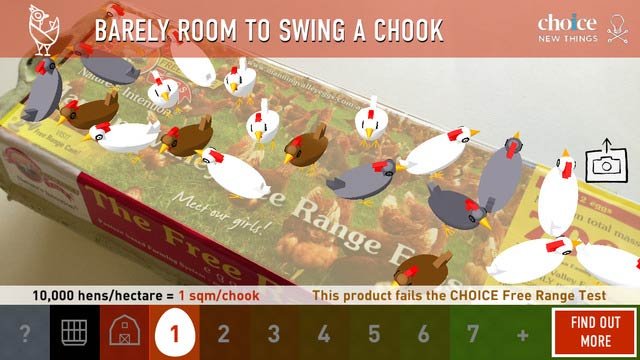A five-store investigation by Fairfax Media found that out of 30 products labelled “free range” only three met the definition endorsed by the RSPCA and the Commonwealth Scientific and Industrial Research Organisation (CSIRO).
At two Woolworths stores, the report couldn’t find a single brand that met the code.
Fairfax used an app called Cluck AR, developed by consumer advocate CHOICE, which scans the supermarket’s eggs sections to determine which products deliver on their promise.

CHOICE says only 10 products out of 46 labelled free-range for sale at Coles or Woolworths nationally meet the CSIRO/RSPCA code.
Neither Coles nor Woolworths’ homebrand or select ranges – which are stocked at nearly every supermarket – meet the requirements, despite being labelled free range.
The vast majority of ‘free-range’ eggs for sale at Coles and Woolworths come from producers who have a stocking density of 10,000 birds per hectare, the legal maximum that allows eggs to still be labelled free range.
A CSIRO draft code, endorsed by the RSPCA, says free-range hens should be stocked at no more than 1500 per hectare unless they are regularly rotated. Consumer watchdog CHOICE says only eggs that meet this standard can be considered “genuine” free-range.
A lower standard leaves hens suffering in unnatural conditions, the RSPCA says.
The Australian Egg Corporation, which backs the current government stocking density laws, says University of Sydney research indicates no difference in hen stress levels in cage or free-range environments.
Supporters also point out 10,000 hens to a hectare is one hen per square metre, which is plenty of room they say.

ALDI has come under fire for continuing to sell own-brand cage eggs. ALDI’s free-range eggs do not meet the CSIRO/RSPCA standard.
New national laws will soon force egg producers to label products with their outdoor stocking density
“Consumers can now decide, ‘Should I buy free range eggs at a lower density of 1500 or a higher density of 10,000? The point is, consumers can now decide,” NSW Minister for Innovation and Better Regulation Victor Dominello said when the laws were announced.
